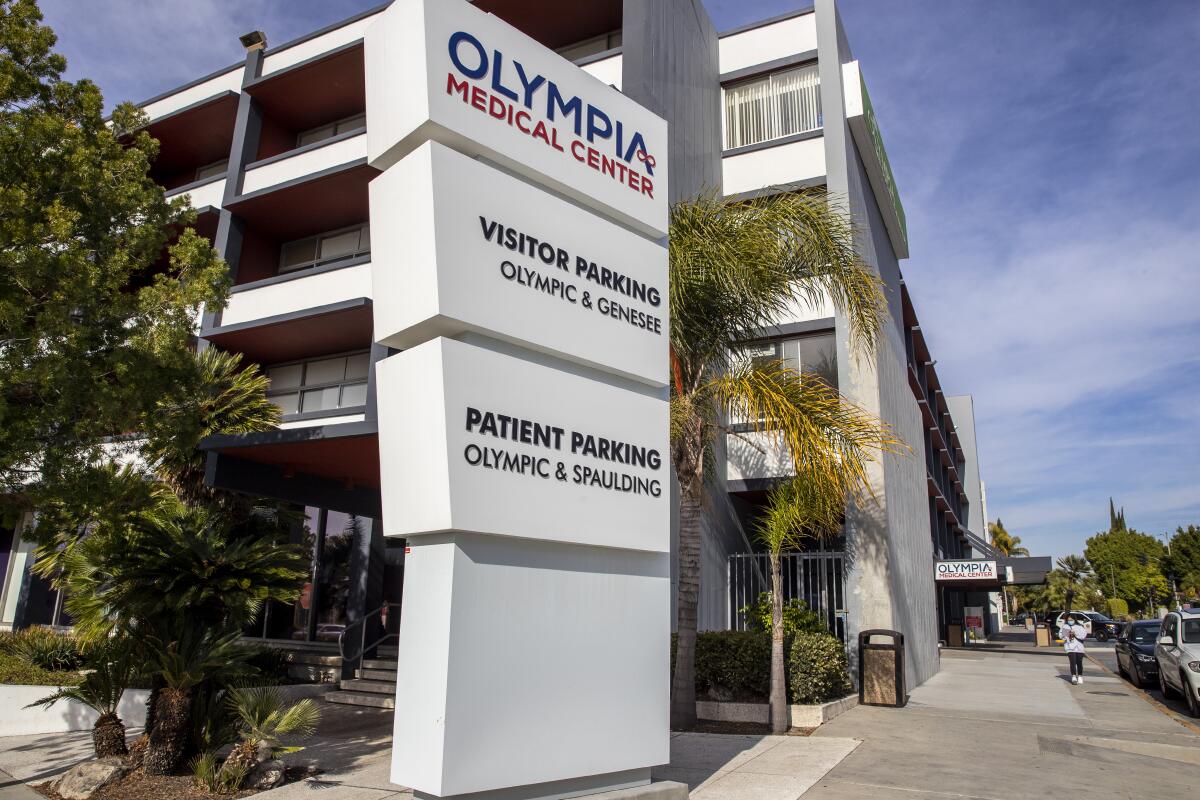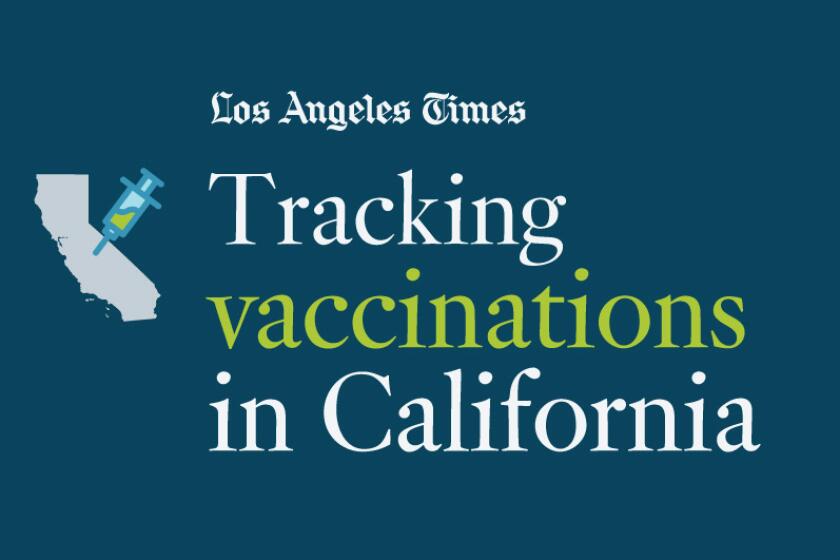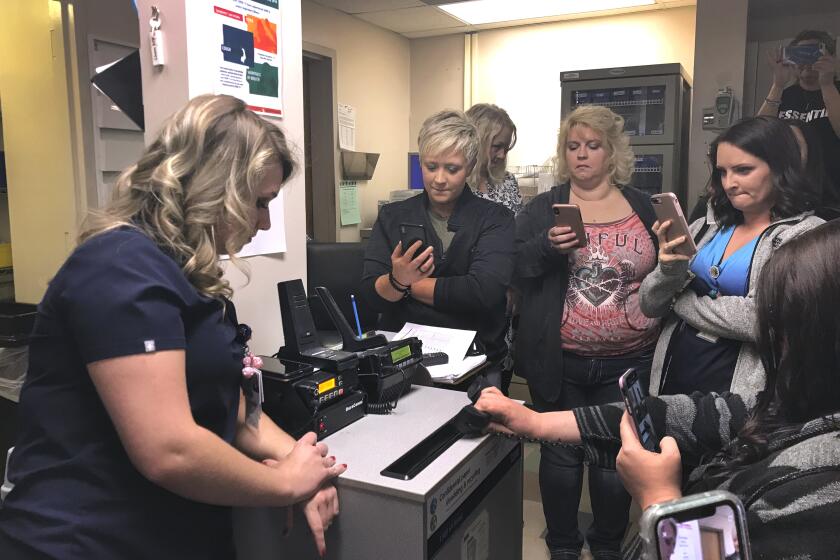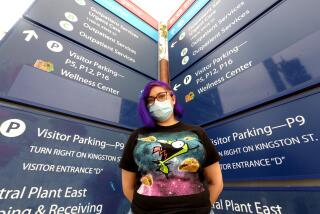A beloved L.A. hospital is about to close. Why no one could save Olympia Medical Center

The announcement of Olympia Medical Center’s sale and closure came on New Year’s Eve. Before the clock struck midnight, the community began mobilizing against it.
City Council members wrote letters, healthcare workers signed petitions, and union groups staged protests in the days and weeks that followed. By the end of January, the L.A. County Emergency Medical Services Agency had passed a resolution calling on officials to keep its doors open for at least another six months.
None of it worked.
Olympia Medical Center, which has served the Mid-Wilshire area since 1947, is slated to close Wednesday.
The pending closure of the facility — which housed an emergency department and six intensive care beds, among other services — has prompted outrage and concern for myriad reasons: Nearly 40% of the hospital’s patients are Black Americans, 63% are over the age of 60 and 90% are covered by Medicare and Medi-Cal. Many residents of the surrounding neighborhood have long relied on the hospital for their primary care.
The hospital’s operator, Irvine-based Alecto Healthcare Services, caught the community by surprise with Olympia’s abrupt sale to UCLA Health — with some critics questioning why the company received more than $25 million in COVID-19 relief funds at a time it was planning to close the hospital.
An Alecto representative said the decision to sell predated the pandemic.
While the community sees the transaction as a betrayal of public trust for a much-needed resource, public policy experts said it’s business as usual in the world of healthcare.
“For-profit hospitals have autonomy over what they’re going to do and whether they’re going to sell,” said Joanne Spetz, director of the Philip R. Lee Institute for Health Policy Studies at UC San Francisco.
“Nobody can tell them they have to stay open, in the same way that nobody can tell a restaurant downtown when it closes that it has to stay open.”
Many details of the sale, including the purchase price, are not publicly available. A Times’ public records request for sales information from UCLA will not be answered until at least May 28, according to the university.
UCLA Health, which took ownership of the property in January and is leasing it back to Alecto while it winds down services, said it provided the company with “the ability to keep Olympia Medical Center’s doors open” long enough to help see the community through the pandemic. UCLA Health is exploring plans to turn the property into a mental health facility.
Michael Sarrao, Alecto’s executive vice president and general counsel, and Matt Williams, Olympia’s chief executive, declined to comment about the transaction.
Olympia’s closure also reflects a pattern for the California hospital industry at large, which is undergoing a sustained era of mergers and acquisitions. Over the last few decades, there has been “continuous consolidation in the healthcare industry,” said Glenn Melnick, professor of health economics at the USC Sol Price School of Public Policy.
Many small, independent hospitals have been “gobbled up” by larger chains, Melnick said, while several distressed hospitals have been bought by for-profit entities who tried to make them financially solvent.
“In some cases that benefits consumers, in other cases it doesn’t,” he said.
According to California’s Office of Statewide Health Planning and Development, about 35% of the state’s hospitals were owned by private investors in 2019, up from about 30% five years prior. The rest are public hospitals, private not-for-profits and university systems.
In most instances, those hospitals are subject to scrutiny if they want to sell: State law requires the attorney general to review and consent to sales of nonprofit healthcare facilities.
Because Olympia is owned by for-profit investors, its sale required no such approval.
At a virtual hearing about Olympia’s closure attended by nearly 200 people in January, public testimony was overwhelmingly opposed to the shutdown.
“If it wasn’t for Olympia, I may not be speaking to you,” said Tony Cowan, a longtime resident of the neighborhood who had a pacemaker inserted at the hospital during a recent cardiac emergency. “Olympia is necessary. It would have taken too long to get to Cedars [Sinai Medical Center]. I thank Olympia for saving my life.”
On the surface, financial bottom lines may seem at odds with the larger needs of a community, but in many ways, that’s how the U.S. healthcare system was designed, Spetz said.
“The theory is that a market-driven system should be more efficient, produce better outcomes and better consumer choice,” she said. “The data don’t clearly make that true.”
Medicare and Medi-Cal patients often lose money for hospitals, which then must rely on private insurance patients to “cross-subsidize” that care to stay afloat, she said.
According to state data, only about 4% of Olympia’s patients had private coverage, compared with 44% at Cedars-Sinai, some two miles away.
“So we can say, ‘Wait a minute, who’s thinking about this community?’” Spetz said. “And the answer is nobody, from a systematic standpoint.”
Experts say about most Americans will need to be vaccinated to bring the coronavirus pandemic under control. Track California’s progress toward that goal.
Recent legislative efforts to increase regulations have also been stymied. In 2020, a bill that would have given the attorney general greater oversight over mergers and acquisitions of for-profit hospitals stalled after vehement opposition from private equity groups and hospital associations.
“We have opposed those bills because the hospital industry is already extremely regulated,” said Jan Emerson-Shea, a spokeswoman for the California Hospital Assn., a trade group that represents more than 400 hospitals in the state.
Most hospitals operate on very slim margins, Emerson-Shea said, and when additional “onerous requirements” come down from the attorney general, it can push them into the red or even kill a sale.
“It’s very hard, in today’s environment, with all of the regulatory requirements that hospitals face, to stay an independent hospital not affiliated in some way with a larger healthcare organization,” Emerson-Shea said.
During the virtual hearing, Sarrao, Alecto’s representative, said Olympia has not been busy and does not provide enough services to justify staying open.
“The patient volumes are declining, the paramedic runs are declining,” he said. “That is the reason we looked for strategic partners and explored various different options, and this was what we viewed as the best option.”
Williamson Memorial Hospital did not treat any COVID-19 patients, but the coronavirus wreaked a devastating financial blow, causing ER visits to plummet.
In the last two years, Alecto has come under scrutiny for two similarly abrupt hospital closures in West Virginia: Ohio Valley Medical Center in September 2019 and Fairmont Regional Medical Center in March 2020. After the closures, the state’s governor, Jim Justice, asked West Virginia Atty. Gen. Patrick Morrisey to look into “any improprieties” conducted by Alecto. The company was not sanctioned. “No fines, penalties or any other amounts were imposed by the West Virginia Attorney General,” Sarrao, Alecto’s general counsel, said.
The attorney general’s office said pressure from the investigation and from the Service Employees International Union resulted in the healthcare company agreeing to pay more than $1.3 million in lost wages and retirement benefits to employees at Fairmont Regional.
Alecto has benefited from significant COVID-19 relief funds from the federal government. The company has received a combined $27.5 million in relief funds and advanced Medicare payments in 2020, according to data released by federal agencies.
EMS Commissioner Jim Lott, at the January hearing, recommended an audit to “see where the money went, just to make certain that this business decision is in the best interest of our community.”
Sarrao said in the hearing that the sale process had been underway since before the pandemic began.
Whereas Medicare loans must be repaid, COVID-19 relief funds are not subject to recoupment if used for healthcare-related expenses or lost revenues attributable to the coronavirus, a representative for the Health Resources and Services Administration said.
Despite the community’s pushback, portions of Olympia have already begun to shut down. On Feb. 22, the hospital’s Center for Wound Management and Hyperbaric Medicine “closed for good,” it announced on Twitter.
That the property may ultimately be turned into a mental health facility could be seen as a silver lining, some public officials said, as those services are sorely needed among the city’s homeless population and will likely be of use for long-term stress from COVID-19.
But the inevitability of Olympia’s closure, at least in its current form, doesn’t lessen the sting for people who have relied on the hospital for years.
“We do not want to close this community resource,” said Luke Bowerman, a registered nurse at Olympia. “We do not want to close a hospital in the middle of one of the biggest periods of need that this country has seen in modern history. We do not want to just simply give up.”
More to Read
Sign up for Essential California
The most important California stories and recommendations in your inbox every morning.
You may occasionally receive promotional content from the Los Angeles Times.













